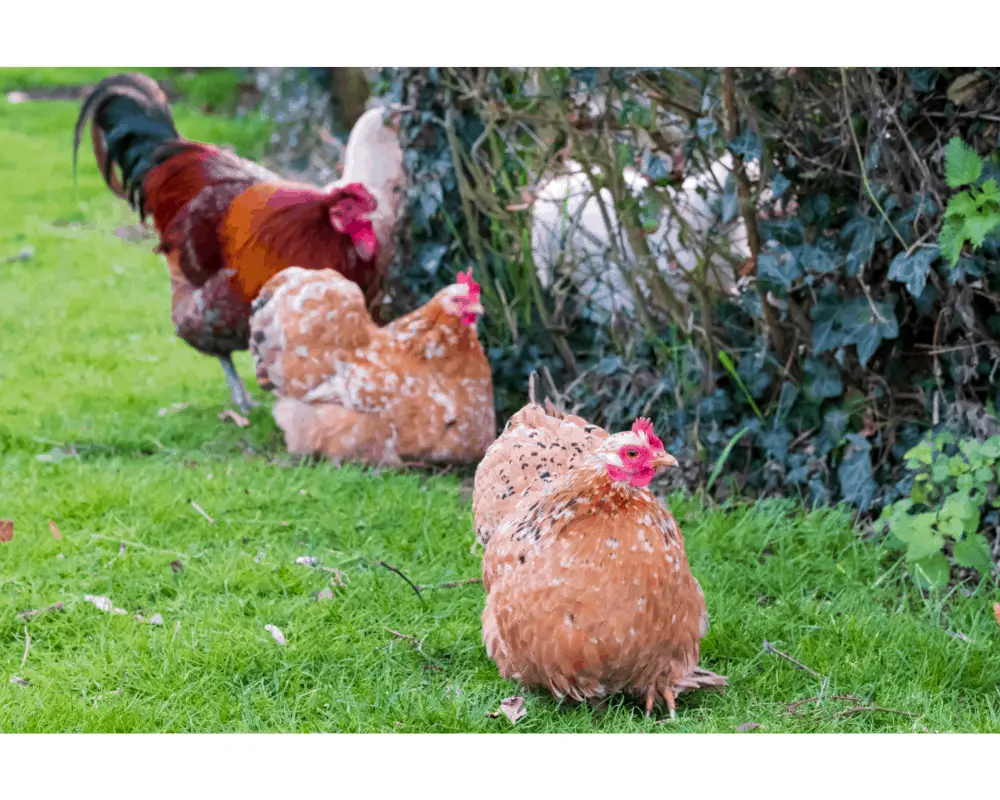Most people know that chickens are flock animals, but what do you do if for some reason you are left with only one lone chicken?
Chickens can show a change in behavior after the loss of a flock mate or a sudden transition from a flock set up to being isolated. These behavioral changes include changes in activity levels and eating habits and are indicative of stress. In most cases, these changes are mild and transient.
For whatever the reason may be: space restrictions, temperament, sudden loss due to predation or disease, it is not uncommon for a backyard chicken owner to find themselves with a single chicken at some stage.

Chickens have evolved to live in groups where there is a pecking order and usually one dominant rooster that will watch out for the safety of the flock. They rely on their flockmates to spot danger and enjoy each other’s company. Chickens will often bond with one or more flock mates and seek out the company of one or more specific flock mates or friends.
Do Chickens Feel Emotions?
While chickens are definitely not able to feel the full array and intensity of human emotions, I know from experience beyond a shadow of a doubt through studying and working with animals for the past decade in vet school and in working as a GP vet, that animals do feel scared, lonely, excited, and sad.
Chickens can express certain behavior due to stress or frustration. These states are usually due to a discord between what is considered normal behavior for chickens and their current situations. Chickens can bond with other animals or humans and show a change in behavior when their companion is lost.
A study on the intelligence of chickens at the University of Adelaide, Faculty of Veterinary Science (Hazel, O’Dwyer and Ryan, 2015) found that after doing a clicker training experiment to evaluate chicken intelligence, the participants reported perceiving that chickens can experience affective states such as happiness, boredom, and frustration.
The hallmark of animal wellbeing in all species has been universally established as the 5 freedoms of welfare. They are as follows:
- Freedom from Hunger and Thirst
- Freedom from Discomfort
- Freedom from Pain, Injury or Disease
- Freedom to Express Normal Behavior
- Freedom from Fear and Distress
Behavior linked to frustration has been documented in chickens (Zimmerman et al., 2000), (Duncan, 1998) due to the inability to express natural behavior such as nesting or dust bathing.
Chickens are Social Animals
Many backyard chicken owners that have larger flocks will be able to point out friendships among certain chickens. Those are the ones that you can usually find browsing together and roosting next to each other. Just the same, there will be certain individuals that can not stand each other and will chase and make disapproving noises when the less-than-favorite flock member comes too close.
Chickens will even develop a relationship with their chicken keeper that extends further than the food bin. You know that they love you when they will eagerly follow you around the backyard or approach you when you hang around where they roam.
Pullets are extremely social. They even share nests and raise chicks together. If one of a group of pullets goes broody, you might find that many of the others will join in. They help each other raise a brood of chicks and some breeds such as the silkie, are even known for hens to share nests.

Do chickens mourn?
Hens are known to distressedly call for their chicks after they have been taken away. Chickens’ emotions are not nearly as complex as human emotions and the emotions that we see them exhibiting are often due to a discord between their natural instinct and their current situation. If they can not act upon natural instinct, for example, sleep or roost in close proximity with flock mates, it will cause stress and frustration.
A change in behavior after a close flock mate is lost, is common. You might see your chicken calling or being restless. You may also notice that they seem more nervous. After a companion passed it is common to see the remaining chook seemingly searching in the usual spots and chirping softly as if to search for their friend.
A mourning chicken will eat less and stand separate from the rest of the flock and be less active.
Signs That Your Chicken is Lonely
Behavior that is considered natural or normal for chickens serves as a good baseline for comparison to determine the welfare of your chook. If a chicken exhibits a reduced frequency of normal behavior, it is a sign of welfare discord.
A Normal Happy Chicken
A chicken that is content will eat, explore, tease its flock mates, dust bathe, scratch and hens will lay eggs. Happy chickens are calm and make soft content noises.
Dustbathing
Dustbathing is considered a normal part of chicken behavior and most chickens will dust bathe 1-2 times a day. Dustbathing has been shown to improve feather conditions and remove external parasites, similar to preening. Even battery chickens will show dust-bathing behavior from time to time.
Perching and walking around
Perching and walking are not only good for physical health but, along with lying down and resting, are part of normal behavior. Inability to walk around or perch is linked to stress and expression of frustration behavior in chickens.
Scratching
A chicken that scratches often, is a happy chicken. Many studies have shown a strong correlation between a bird’s ability to scratch and the frequency of scratching to other markers indicating favorable welfare.
Signs of an Unhappy or Sad Chicken
A chicken that is experiencing stress due to a sudden change in environment or flock setup may show reduced activity or increased hiding. It may spend more time inside the coop and spend less time foraging and scratching.
In some cases, you might see repetitive behaviors such as pacing or pecking at a non-edible object. He or she may become less curious and less confident and may scare more easily when suddenly approached or perceive something as dangerous that previously did not evoke a fear response.
Some hens may stop laying eggs. Hens depend on the security of the flock to raise their chicks and if that perceived security is missing, she may stop laying.
Can You Keep Only One Chicken?
Chickens are flock animals and should ideally be kept with other chickens. Chickens can, however, differ in temperament and some chickens will fare better as only chickens than others would. As a general rule, it is best to have at least 3 chickens.
Hens will fare better alone than a rooster. Roosters may become territorial and can become aggressive and even slightly destructive if kept alone.
I always advise people to get at least 3 chickens. Chickens that live in a flock, and even if it is a flock of just 3 chickens, have a longer life expectancy than chickens kept by themselves. The reason for this may be safety (i.e. being more vulnerable to predators) and welfare-related.
Most chicken owners that have been in the situation of suddenly having only one chicken, report that, after the initial adaptation to being an only chicken, they will generally do okay for some time, but will decline in the long run. Keep in mind that there may be exceptions to the rule depending on your chicken’s temperament and your home setup.
Is Rehoming an Old Chicken a Good Idea?
Chickens have a pecking order in which the young and healthy adults are at the top, followed by the geriatric chickens and chicks. If you would like to rehome your older chicken to be able to offer them living conditions within a flock set up, keep the age of the intended flock in mind. If your remaining chicken is on the older side, she may be bottom of the food chain in the new flock.
Also keep in mind that older animals tend to be less tolerant of stress, meaning that stressful situations such as a change of environment or introduction to a new flock may be perceived worse by an older chicken.
If you have a lonely hen that still lays eggs and goes broody from time to time, you may consider giving her a few fertilized eggs to hatch. Her new chicks will then eventually become her flock mates and that will eliminate the politics of introducing new chickens.
How to Cheer Up a Sad or Lonely Chicken
What do you do if you do not want to or are unable to get any more chickens? There are a few solutions that you can try. The success of these suggestions may vary depending on the temperament of your chicken.
Environmental enrichment by placing toys or interesting treats will help distract them. If you have one lonely chicken, consider introducing 2 pullets.
1. Environmental Enrichment
Chickens get bored easily and often depend on their flockmates to provide them with entertainment. Providing entertainment such as a piece of cabbage or lettuce suspended just low enough for them to reach, or a swing perch can help alleviate some of the boredom and loneliness they might experience.
Another trick that has worked wonders in the past is providing them with a small mirror. Nobody knows why but almost any and all birds just love to admire themselves!
2. Give Them Lots of Attention
Lots of attention and interaction is ultimately the golden rule to keep a lonesome backyard chicken happy. Many chicken owners that have found themselves in the situation of keeping a lonely chicken agree that spending as much time as possible with the chicken is the ultimate rule to keeping them happy.
Many of these stories usually end up with the lonely choock sleeping inside the garage and eventually spending some time in the kitchen with the family. If you are willing to clean up after them, and your family doesn’t mind, you might find yourself keeping an indoor chicken. They still do need to scratch in the garden and spend time outdoors, but some lonely chickens will thrive on social interaction from a human family. The opposite can also be true as some chickens are shy and prefer to keep their distance from humans.
3. Get Them (Non-Chicken) Companions
If you have other animals around such as small dogs that do not mind the chickens or animals such as rabbits, ducks, geese, or hamsters, they too can serve as companions for a lonely chicken. There are wonderful stories of chickens bonding with other species and if you are in a situation where getting more chickens is out of the question, this may be a solution to your problem.
4. Make Life as Easy as Possible
Chickens do not like entering dark places by themselves. Chickens do not see very well in the dark and depend on their flock mates to inform them of any possible dangers. Providing them with a light inside the coop until they have settled in at night will do wonders for a nervous lonely chicken.
Providing plenty of food in water easily found in an area where they feel secure will help eliminate unnecessary stress. Your mission is basically to make sure they have the best and easiest life you can possibly provide them with.

Introducing New Chickens
If you would like to introduce new chickens to your current lonely chicken, there are a few things to keep in mind:
1. Isolation
Before introducing a new chicken to your yard, they need to be isolated for 2 weeks. Make sure you have an area where you can separate the new chickens from your current chickens. This will prevent the potentially disastrous consequences of introducing contagious diseases to your current flock.
2. Preferably NPIP Chickens
The NPIP (National Poultry Improvement Program) is a voluntary scheme that poultry breeders can sign up to where flocks are monitored for Pyllorum and Typhoid. This does not mean that the flock is completely disease-free, but rather that they are free of these 2 potentially deadly contagious diseases.
3. Age of The New Chickens
Chickens should only be introduced when they are old enough to defend themselves. If they are still very young, you might risk the chicks being bullied by the older chicken. A point of lay hen is ideal as they are old enough to defend themselves but still young enough to not be perceived as a threat by your other chicken.
4. Enough Space and Food
Before introducing new chickens, increase the amount of food and water available, and offer more food and water bowls. If your chicken perceives the new ones as a threat due to limited resources, it might cause bullying as they try and compete for resources. In a caged-in run, the chickens need space to run and play. In the coop, they need enough space to spread their wings.
Methods of introduction:
1. Slow introduction
This is done by keeping the two groups separate but in view of each other for a week. This should preferably be done after the 2 week isolation period. After one week, allow them to free-range together. If there are enough resources and space, they should eventually accept each other, but a few ruffled feathers and a scuffling or two is not uncommon.
2. Chuck-em-all-together
Again, this should be done after the 2 week isolation period. Keep them within sight of each other during daylight and as soon as they go inside the coop to roost, introduce the new chickens. At this time, they are least likely to fight and should accept the new ones more willingly. A slight scuffle is still to be expected. Make sure to be present when you let them out of the coop in the morning to be able to prevent any bad fighting.
Whichever method you choose, make sure you have a number of water and food stations in the run spread out so that all the chickens can get to their food and water as they will guard food and pester others away
Conclusion
It is not uncommon to find yourself owning just one chicken at some point. A sudden change in circumstances can have a major effect on the welfare of the remaining chicken, but luckily there are a few things you can do to keep your remaining chook happy.
References
- Costa, L., Pereira, D., Bueno, L. and Pandorfi, H., 2012. Some aspects of chicken behavior and welfare. Revista Brasileira de Ciência Avícola, 14(3), pp.159-164. https://www.scielo.br/j/rbca/a/L3JqQJCP3QrBGBySsgscvFN/?lang=en
- Duncan IJH. Behavior and Behavioral needs. Poultry Science1998; 77:1766-72. https://www.sciencedirect.com/science/article/pii/S0032579119412315
- Freire, R. and Hazel, S., 2017. Are chicken minds special?. Animal Sentience, 2(17). https://www.wellbeingintlstudiesrepository.org/cgi/viewcontent.cgi?article=1223&context=animsent
- Hazel, S. J., O’Dwyer, L., & Ryan, T. (2015). “Chickens are a lot smarter than I originally thought”: Changes in student attitudes to chickens following a chicken training class. Animals, 5(3),821-837. https://www.mdpi.com/2076-2615/5/3/821
- Mitchell, M. and Kettlewell, P., 1998. Physiological stress and welfare of broiler chickens in transit: solutions not problems!. Poultry Science, 77(12), pp.1803-1814. https://www.sciencedirect.com/science/article/pii/S0032579119412376
- Nicol, C., n.d. The behavioural biology of chickens. https://books.google.co.za/books?hl=en&lr=&id=yt0cCgAAQBAJ&oi=fnd&pg=PR3&dq=chicken+ethology&ots=YrmACWHa7e&sig=g40wblcTC2-mzk67QNwutWsANsA&redir_esc=y#v=onepage&q=chicken%20ethology&f=false
- Rettenbacher, S., Möstl, E., Hackl, R., Ghareeb, K.† & Palme, R., Dr. (2004) Measurement of corticosterone metabolites in chicken droppings, British Poultry Science, 45:5, 704-711, DOI: 10.1080/00071660400006156
- Zimmerman PH, Koene P, van Hooff JARAM. Thwarting of behavior in different contexts and the gackel-call in the laying hens. Applied Animal Behavior Science 2000; 69:255264. https://www.sciencedirect.com/science/article/abs/pii/S0168159100001374

